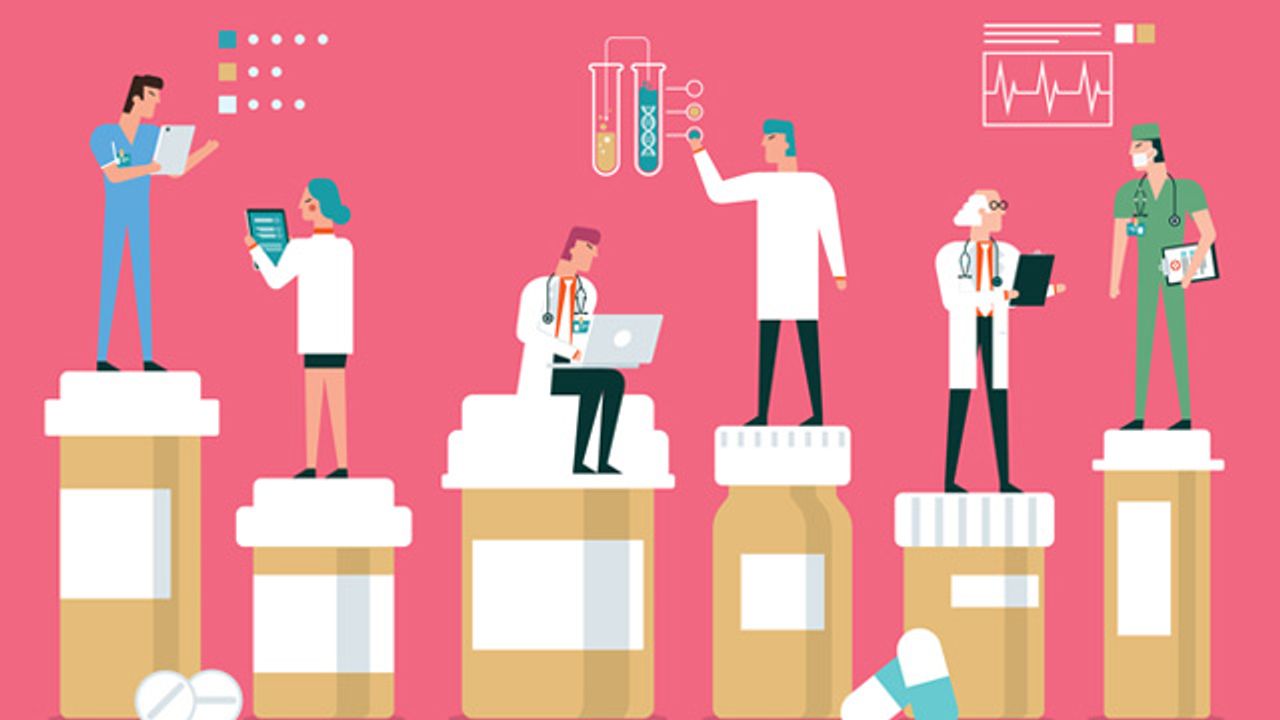
How Personalized Medicine Is Transforming Healthcare

How Personalized Medicine Is Transforming Healthcare
Complete the form below and we will email you a PDF version of"How Personalized Medicine Is Transforming Healthcare"
在过去的几十年中,医疗计划大多是一件尺寸的人。临床医生根据该疾病类别为患者开出不同的药物或治疗选择。但是,患者对不同的治疗方法的反应通常不同,因此该过程的一部分是在最不严重的副作用方面制定了最有效的治疗方法。个性化医学采用完全不同的方法。它的目的是根据患者独特的生物学构造来开发精确的临床图片。这种信息深度使临床医生能够鉴定出可能影响其疾病易感性的基因,RNA或蛋白质方差。
“通过学习针对每个患者或患者亚组的独特疾病特征,个性化医学旨在设计智能和量身定制的药物,这些药物直接被这些特征告知,以更精确和有针对性的方式治疗疾病。”Dr. Ashley Sanders,a group leader at the Max-Delbrück-Centrum für Molekulare Medizin (MDC) in Berlin, Germany.
虽然个性化医学是现代医学的一种新方法,但将患者视为个人的想法几乎没有新颖。早在公元前第二千年埃及医学, followed later by Greek medicine, focused heavily on understanding an individual’s health, as well as their circumstances and beliefs. The one-size fits all approach arguably came into common usage with the rise of pharmaceutical companies in the early 20Thcentury. Personalized medicine offers a return to these founding principles of treatment.
在本文中,我们讨论了将个性化医学脱颖而出的一些进步。
破解遗传密码
The人类基因组项目也许是迈向个性化医学的最重要步骤之一。简而言之,它为医学的预防而不是纯粹的反应性铺平了道路。人类基因组的完整序列于2003年发表,使科学家和临床医生能够确定成千上万种疾病的遗传变异 - 一种称为基因组学的方法。它还为快速,便宜和准确的方式铺平了道路DNA and RNA sequencing, placing genomics at the core of research and treatment efforts for various human diseases.
癌症是基因组学如何使用的一个很好的例子为个别患者量身定制治疗based on genetic information. No two patient’s cancers are identical, and how a cancer develops is due to a complex relationship between基因与环境。DNA测序提供了一种方法,使临床医生能够识别遗传基因,这些基因已知可以增加个人对某些癌症的敏感性。
After a diagnosis of cancer, DNA sequencing of tumor biopsies can identify genetic markers of cancer, allowing clinicians to direct certain anticancer treatments towards that specific abnormality (if the drug is available). For example, approximately seven percent of non-small cell lung cancers (NSCLCs) are caused by a heritable mutation in the阿尔gene encoding anaplastic lymphoma kinase (ALK). This discovery led to the development of ALK blockers such asCeritinib,可以为患者选择性地处方阿尔患有NSCLC的突变。
最近,一种新的基因组学方法称为躯体镶嵌正在进一步采取个性化医学,以使疗法适应个别患者细胞。
“我们的小组研究体镶嵌,这代表了我们如何理解疾病遗传学的激动人心的范式转变。我们正在使用单细胞技术了解细胞中形成的分子变化和DNA突变以及它们随着年龄和疾病的年龄而变化的方式。我们的目标是使用这些信息直接针对可能参与甚至推动疾病特征的突变细胞。”桑德斯说。
非酒精性脂肪性肝炎的非侵入性监测

非酒精性脂肪性肝炎(NASH)是一种非酒精性脂肪肝疾病(NAFLD)的侵略性形式,这是一种以肝脏脂肪变性为特征的肝脏疾病,伴有肝细胞损伤和炎症。下载此白皮书以发现我可以的测定法可靠地预测肝脂肪的积累,使生物标志物具有易感性的敏感性,并有助于预测干预措施在特别的患者亚群中的成功。
View Whitepaper
赞助内容
非酒精性脂肪性肝炎的非侵入性监测

非酒精性脂肪性肝炎(NASH)是一种非酒精性脂肪肝疾病(NAFLD)的侵略性形式,这是一种以肝脏脂肪变性为特征的肝脏疾病,伴有肝细胞损伤和炎症。下载此白皮书以发现我可以的测定法可靠地预测肝脂肪的积累,使生物标志物具有易感性的敏感性,并有助于预测干预措施在特别的患者亚群中的成功。
View Whitepaper赞助内容
多组学的兴起
尽管基因组学是个性化医学的起点,但许多其他Omics技术的兴起正在扩大避免重复的潜力。Proteomics现在,转录组学与基因组学一起使用,以了解从遗传密码到RNA转录,蛋白质合成和细胞功能可能出现的异常。
“These multiomic technologies are central to personalized medicine. It’s what allows us to deeply characterize patients and disease states so that targeted treatments can be developed,” Sanders notes.
Multiomic technologies are used to identify biomarkers of disease much like阿尔mutations that occur in a subset of NSCLCs. Proteomics, for example, allows clinicians and scientists to understand all the molecular processes in a patient that drives a disease. Techniques such as质谱(MS)允许对具有非凡敏感性和轻松的患者的分子变化进行“高通量”鉴定和定量。
虽然较旧的基于MS的蛋白质组学存在敏感性和特异性的问题,但较新的技术(例如,液相色谱-MS)允许科学家从大量患者中生成有关数千种蛋白质的高度详细数据。确实,MS开始开发自己的临床领域,基于MS的个性化药物治疗,但是由于与该方法相关的高成本,只有精选的实验室才能受益。因此,许多临床实验室继续使用较旧的低通量antibody-based methodsfor clinical diagnostics until accessibility to MS-based methods are improved.
Big data, big potential
创建单个患者的详细,整体视野需要巨大的计算能力。Estimates vary, but as we have between 19,000 and 22,000 genes in our genome,我们的蛋白质组大致相同。The complexity of understanding how this affects human disease is staggering, and that’s even before you consider variations that arise from alternative splicing, single amino acid polymorphisms and翻译后修改。
“This is big data which simply can’t be analyzed manually,” saysAnnalisa Occhipinti, associate professor at Teesside University, UK. “You need advanced computational techniques to find the source of a disease like cancer in all that data,” she adds.
Occhipinti,开发数据科学工具,用于与她的同事Claudio Angione一起使用,也是Teesside University的副教授。他们一直在使用数据科学来预测来自多组学数据的患者结果。
“我们从患者的临床概况开始,并将其与多组学数据以及扫描结果进行其他测试结果。我们使用机器学习将这些数据汇总在一起,该数据将数据从一名患者与大量患者的数据联系起来。这种交叉比较使我们能够预测癌症将如何进展以及哪些药物可以用来治疗该患者的特定癌症亚型。” Occhipinti说。
The rise of data science has been integral to personalized medicine: it is the node that integrates patient data and determines how to treatTheir疾病。像轻松访问DNA测序一样,随时可用的数据科学工具有助于将多解词整合到医疗保健系统中。但是,Occhipinti所描述的数据科学工具与临床使用相距甚远。
“一个重要的问题是计算预测的准确性。这比专家肿瘤学家更准确吗?这归结为培训算法。计算模型从中学到的数据越多,它们的预测准确性就越大。但是,也许问题是红鲱鱼,因为我们正在研究数据科学工具如何补充临床医生的决策而不是完全取代它。” Angione补充说。
Treatingyou和your基因
也许具有讽刺意味的是,数据科学使科学家不仅可以将患者视为一组数字。通过整合大量患者数据,临床医生和科学家在了解个人如何处理疾病方面具有很大的潜力。毕竟,每个患者都有不同的应对方式和应对疾病的反应。
Going back to the approaches used in ancient Egyptian medicine, personalized medicine must aim to incorporate psychological and environmental aspects of a patient’s life to treat diseases. Many scientists and clinicians are taking this on board, aiming to study subjective aspects of disease states with empirical techniques. For example, scientists have recently identified patterns of brain activity thatcorrespond to clinical pain。While still translational work, a recent study published in自然医学describes the development of an algorithm that can detect chronic pain states in individual patients based on their brain activity recorded with magnetic resonance imaging (fMRI). With this data, clinicians aim to assess if a patient is suffering and what they can do to treat it.
个性化药物什么时候可以到达诊所?
自2000年代初期人类基因组发布以来,已经取得了巨大的进步来使医学更具个性化。多组学和数据科学技术的繁荣是有助于开发更好地针对个别患者的需求量身定制的医疗保健选择,而不是将它们适合于一种尺寸的方法。
However, according to Sanders, personalized medicine has some way to go before being systematically integrated into healthcare systems: “Generating the multiomics data required to deeply characterize patients requires expensive technologies that are not readily available in clinics. Extracting the disease characteristics from these data requires specialized knowledge and computational experience which takes time to analyze. The current challenge is to reduce the cost and time for diagnosis so that we can implement personalize medicine in routine clinical practice.”
Perhaps what’s needed most to make personalized medicine accessible for more patients is not technological advancements, but methods to streamline personalized healthcare approaches into broader healthcare systems.



